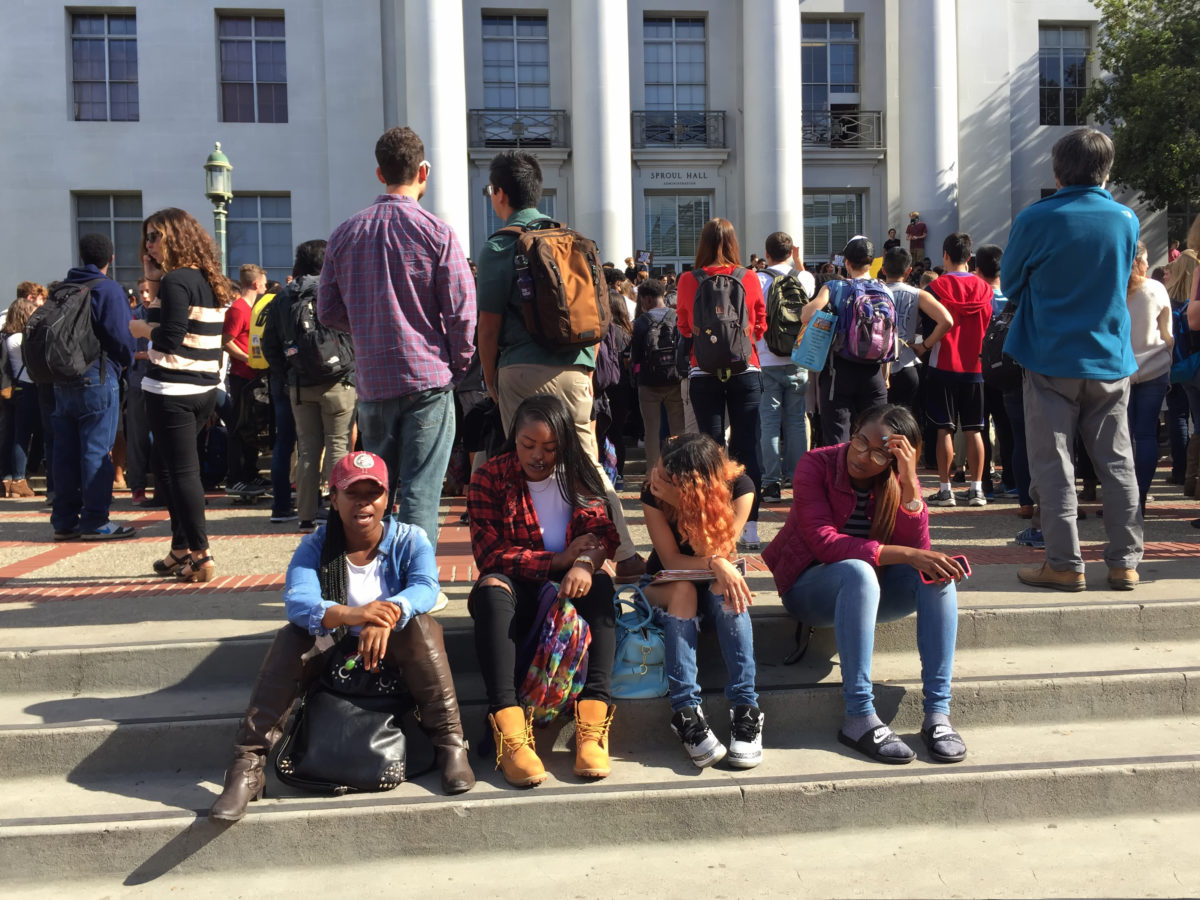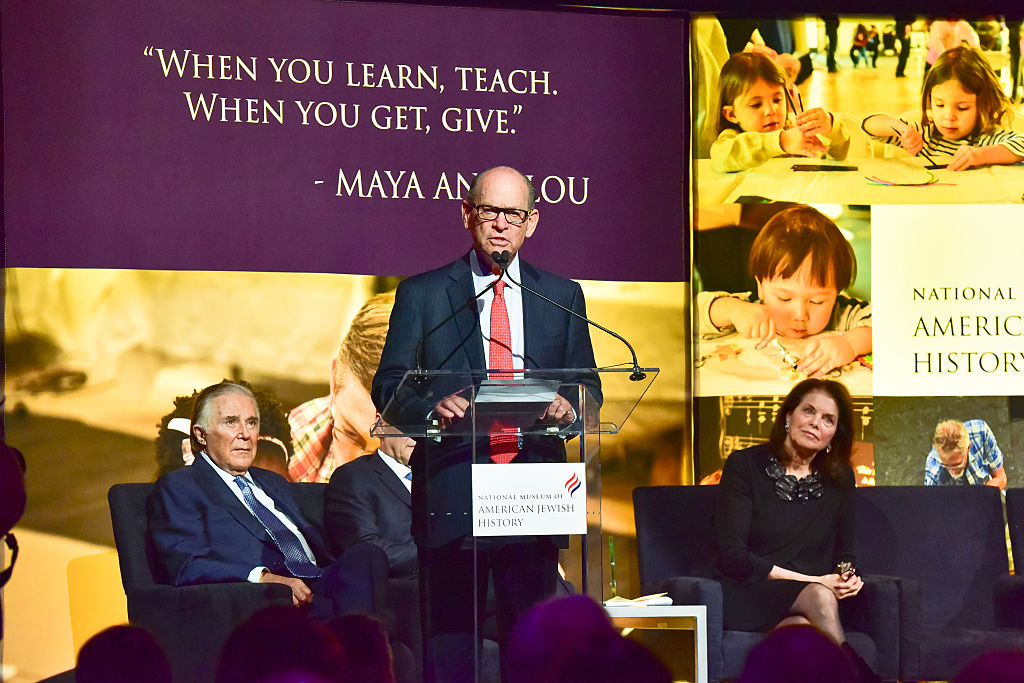Your Daily Phil: Facebook rejects Chabad ads + Reboot creates new music for classic Jewish horror film
Good Tuesday morning!
Facebook has rejected ads for a class about antisemitism and Jewish identity offered by the Rohr Jewish Learning Institute (JLI), the adult education arm of the Chabad-Lubavitch movement, Rabbi Zalman Abraham, the institute’s executive director, told eJewishPhilanthropy.
The ad for the class, called “Outsmarting Antisemitism,” promises to “examine the roots of this ancient hatred.” Facebook’s message states that the ad might have been rejected because it is about “sensitive social issues” that could influence elections or pending legislation. Of the 450 instructors teaching the course, 50 were trying to run ads on Facebook, which rejected all of them.
Facebook has come under criticism for disseminating hate speech and promised to crack down on it, most recently last week at the International Forum on Holocaust Remembrance in Malmö, Sweden. Facebook COO Sheryl Sandberg said the company is “now removing 15 times more hate speech than we were just five years ago.”
“While we commend Facebook’s efforts to block hate speech across their platforms, it is frustrating that they have not yet figured out how to discern hate speech from its opposite and instead choose to shut down all conversations on the topic,” Abraham said.
The Anti-Defamation League, one of the organizations that called for an advertising boycott of Facebook and Instagram in July 2020, said that it’s aware of the problem of tech companies “overenforcing” their hate policies against benign content, although it hadn’t seen the ads Chabad has tried to run. Facebook needs to address hate speech while not penalizing good actors, an ADL spokesperson said: “Given Facebook’s vast resources, employing the appropriate amount of human reviewers to make this possible should be within their reach.”
JLI requested a review by an ads manager, but the review was rejected, Abraham said. Facebook did not respond to requests for comment by eJewishPhilanthropy.
FAMILIAR TUNE
A sprawling Reboot project creates new music for a classic horror film

Courtesy
First, Gretchen Gonzales Davidson was a musician, a member of the indie band Slumber Party and a high-profile figure in Michigan’s experimental scene. Now, she’s also a philanthropist, married to Ethan Daniel Davidson, who helped grow the William Davidson Foundation, named for his father. Those two identities have merged in a new project she’s helping to create and fund — the rescoring of “The Golem: How He Came Into the World,” a German film about the monster of Jewish folklore, Davidson told eJewishPhilanthropy’s Helen Chernikoff.
A complicated monster: “When I think of the golem, I am reminded of how important it is to be careful of what you wish for,” Davidson said, referring to the golem’s combination of protective and destructive urges. “We need to be mindful of the consequences surrounding the words we say, and the things we create.” Davidson is a member of the band Threshing Floor, which created the music for the first section of the rescored film. She was also one half of the creative pair who conceived of the idea, which is a project of Reboot, the nonprofit network of Jewish creatives. The other was David Katznelson, Reboot’s CEO, also a musician and music producer. Finished in 1920 but released in 1921, “The Golem” was directed by Paul Wegener and Carl Boese and based on a novel by Gustav Meyrink. None of the three were Jewish, but other members of the company were, such as Hans Lansberger, who wrote the original score, and actor Ernst Deutsch.
A movie and a moment: “These people who were in the same troupe at the same time had very different fates,” Katznelson said. “Some joined the Nazis; some fled; some were killed. You’re seeing a moment in history. That goes beyond the film itself.” Reboot has cut the film, which is in the public domain, into eight parts, and paired each section with music and commentary. In the first one, “Magic and Mystics,” a professor of philosophy and religion examines the mystical spiritual leader Rabbi Judah Loew ben Bezalel, creator of the golem. Threshing Floor, which had come together last spring to create music during Reboot’s all-night online Shavuot event, DAWN, provides the score. Part of the motivation for “The Golem” project was the band’s desire to make more music together. Reboot was also eager to explore putting music to other silent films, as the group had done this past Passover, for Cecil B. DeMille’s “Ten Commandments.”
ON THE HILL
Senate Dems propose holding nonprofit security funding steady

Tom Williams-Pool/Getty Images
Senate Democratic leaders followed the House’s lead in holding Nonprofit Security Grant Program (NSGP) funding steady at its 2021 level in its 2022 budget proposal released Monday afternoon, Jewish Insider’s Marc Rod reports.
Holding: The NSGP — which provides nonprofits and religious groups with funding to enhance their security — received $180 million in 2021. The decision to maintain the current level comes even though the program was able to fund less than half of the grant applications received in 2021, and amid a spike in hate crimes over the last year.
Not giving up: Advocates for increased funding — who had largely coalesced around $360 million as the appropriate funding level for 2022 — say they’ll keep pushing for more funding. “I will continue to work with Senate leadership to ensure that Congress allocates increased and robust resources for the Nonprofit Security Grant Program this year,” Sen. Jacky Rosen (D-NV) told Jewish Insider. “As made clear by the alarming uptick in antisemitic incidents in recent months, there is an urgent need to provide vulnerable Jewish institutions with physical security enhancements.”
Not over yet: A source close to the appropriations process told JI that the funding level could be increased in final negotiations between the House and Senate, but that ensuring the NSGP received funding in both the House and Senate bills was a critical first step.
THE FULL PICTURE
Telling the complete story of Israel to North American Jews

Shutterstock
“How did the American Jewish community reach the point where today, more than half of its members between the ages of 18-29 say that they feel no emotional attachment to Israel?” asks Dan Elbaum, head of North America at The Jewish Agency for Israel, in an opinion piece for eJewishPhilanthropy.
Looking in the mirror: “If we are looking to cast blame, there are no shortage of directions to point our finger. An unsolvable Israeli-Palestinian conflict, partisan politics on steroids and assimilation may all top the list. Yet, any honest conversation in the American Jewish community needs to include taking the difficult step of looking in the mirror and asking ourselves the following fateful questions: What are we doing wrong? What exactly is the Israel that we are presenting to American Jews? And, most importantly, what must we do differently?”
COMPETITION OF IDEAS
Jewish college students need a lesson in free speech

“One of the hallmarks of Jewish tradition is its intense focus on debate and disagreement. This is so much the case that some have argued that Talmud is essentially an ‘anthology of arguments’ and historical discourse is so prized and cherished in Jewish thought and history that Judaism has sometimes been called a ‘culture of argument,’” writes Samuel Abrams, a professor of politics at Sarah Lawrence College, in an opinion piece for eJewishPhilanthropy.
Current state of speech and expression on campus today: “Unfortunately, it appears that the seminal import of civic discourse is being lost on many of the nation’s younger Jews – namely those currently enrolled in colleges and universities. A just-released survey from the Foundation for Individual Rights in Education captures the voices of over 37,000 students at 159 colleges and provides empirical insight into the current state of speech and expression on campus today. The picture is not good. The data shows that Jewish students are leading the charge to shut down the ideas of others.”
Worthy Reads
The Out Crowd: Grassroots activism is essential to American democracy, but such movements often fail to achieve lasting impact when funded by multibillionaires and philanthropy on both the right and the left, writes Michael Hartmann in a Philanthropy Daily review of Donald T. Critchlow’s In Defense of Populism: Protest and American Democracy. Critchlow contrasts the Tea Party and Occupy Wall Street, well-funded movements that fizzled, with anti-Communism, which didn’t need backing to succeed. “Today’s politics of the street appears closer to that of the late Roman Republic when oligarchs, such as Caesar, Sulla, and Catiline, organized mobs to serve their factional interests,” Hartmann concludes. [PhilanthropyDaily]
Big Questions: The Generosity Commission, a new $3.8 million, two-year effort studying why lower- and middle-income people are giving less frequently, is an example of the “toxic intellectualization” that is pervasive among left-leaning institutional philanthropy, asserts Vu Le in his blog, Nonprofit AF. What the sector’s biggest organizations should do instead: protect voting rights, streamline grantmaking practices and give more in the near term to address pressing problems. “Funders love commissions, white papers, summits, logic models, surveys. This is a self-reinforcing cycle where commissions lead to surveys and focus groups, which lead to white papers, which lead to summits, which lead to commissions,” Le laments. [NonprofitAF]
Small But Mighty: Professionals in the nonprofit sector casually use the term “small donor,” yet its meaning varies from organization to organization, explain the staff at Inside Philanthropy in one of a series of articles that aims to demystify philanthropic jargon. What’s more important to understand about the concept isn’t any particular number, but the connotation: Small donors generally can’t achieve big impact on their own, but they can do so collectively, through campaigns or giving circles: “Widespread giving by many small donors is arguably essential to democratic philanthropy and a democratic society, and is often one of the more stable forms of nonprofit revenue.” [InsidePhilanthropy]
Community Comms
Be featured: Email us to inform the eJP readership of your upcoming event, job opening, or other communication.
Word on the Street
The Israeli government will provide work permits to foreign tech students, import tech experts and encourage Jewish tech professionals to immigrate… The Earthshot Prize, established by the Royal Foundation of the Duke and Duchess of Cambridge, announced the inaugural winners of its global competition for groundbreaking scalable solutions to five of the greatest environmental challenges facing the planet… The Wallace Foundation launched a five-year, $102 million initiative aimed at ensuring educational equity by developing principal pipelines to prepare effective school leaders… The Long Island Community Foundation granted $610,000 to help 30 nonprofits provide science and arts programs to children with special needs…
Pic of the Day

Dayenu
Rabbi Jennie Rosenn, CEO of the Jewish climate organization Dayenu, joined faith leaders at the “People vs. Fossil Fuels” action in front of the White House last week.
Birthdays

Sean Zanni/Patrick McMullan via Getty Images
Longtime former CEO of Aramark Corporation, he presently serves as chairman of the University of Chicago’s Board of Trustees, Joseph Neubauer…
Founder and former ringmaster of the Big Apple Circus, Paul Binder… Pulmonologist in Plano, Texas, he is also the author of five mystery novels, Dr. Kenneth L. Toppell… Writer, scholar and former Israeli ambassador, Yoram Ettinger… Obstetrician and gynecologist at the Center for Fetal Medicine in Los Angeles, Dr. Lawrence David Platt, … Retired hospitality executive, Michelle Fischler… Pulitzer Prize-winning reporter, she directs the journalism program at MIT, Deborah Blum… Founder and president of Americans for Tax Reform, Grover Norquist… Retired supervisor for Minnesota’s Pollution Control Agency, David Alan Cera… Member of the Knesset and former mayor of Jerusalem, Nir Barkat… Co-owner of the NFL’s Tampa Bay Buccaneers and English Premier League soccer club Manchester United, Avram A. “Avie” Glazer… Social psychologist and professor at New York University focused on the psychology of morality and moral emotions, Jonathan David Haidt… Chief rabbi of Ukraine, he also serves as vice president of the European Jewish Congress, Rabbi Yaakov Dov Bleich… Founder of Global Policy Associates, former White House Jewish liaison in the Clinton administration, Jay Footlik… Ritual coordinator at Congregation Emanu El in Houston, Shira Kosoy Moses… Actor, director, producer and screenwriter, Jon Favreau… Recent mayor of Portland, Maine, now a nonprofit executive, Ethan King Strimling… Editor-in-chief of Input, Joshua Ryan Topolsky… Film director, screenwriter and producer, Jason R. Reitman… VP of development and strategic Initiatives at itrek, Evan Majzner… David Ochs… Pittsburgh-based founder and CEO of Mamalux, Lindsay Applebaum Stuart… Founder of iTrade[dot]TV, equities trader and financial marketer, Elie Litvin…
Email Editor@eJewishPhilanthropy.com to have your birthday included.








